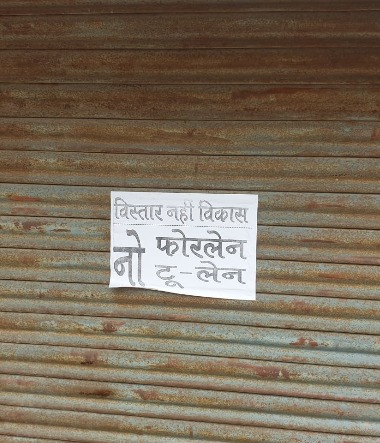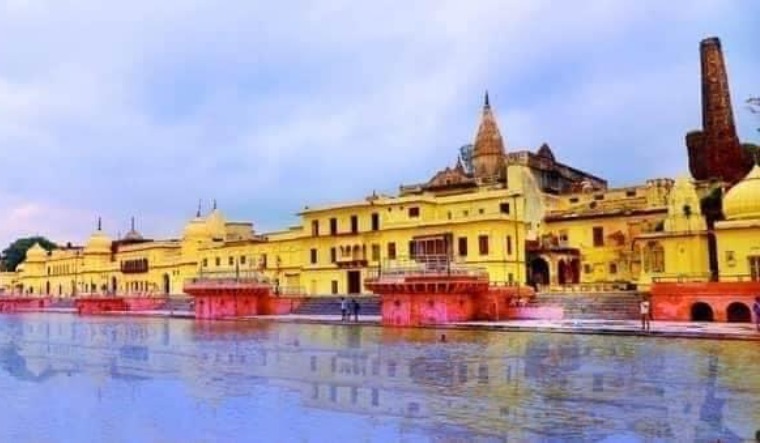Long-term prospects for business in Ayodhya had started to look up in anticipation of the Supreme Court verdict on the Ram Janmabhoomi title suit in November last year. But months later, little has moved on the ground.
 A notice erected by traders against expansion plans in Ayodhya | Puja Awasthi
A notice erected by traders against expansion plans in Ayodhya | Puja Awasthi
The COVID-19 pandemic is only part of the reason. The government has not yet identified and marked the land it will acquire for the various projects it will bring to the town and its neighbouring city of Faizabad.
Amit Ghai, an automobile dealership owner in Faizabad, said, “While the interest has remained and there have been agreements on land deals, no registries have happened.”
Sharad Chandra Kapoor, owner of one of Faizabad’s oldest hotels who had initiated a revamp and renovation of his property, said, “I had hoped to buy another piece of land for a new property but that has been put on hold. Business had crashed since the start of the pandemic.”
All grand events planned since the start of the year have been non-starters. On March 28, the Vishwa Hindu Parishad cancelled the 84 Kosi Parikrama, which was to start on April 8 and was expected to draw many times the number of devotees who had attended it last year. Before that, the body has announced a downsizing of the Ram Mahostav, which was to take place from March 25.
In 2019, of the 54.06 crore tourists who visited Uttar Pradesh, 2.01 crore had visited Ayodhya, as per data released by UP Tourism. This year, those numbers were expected to be surpassed during the initial celebrations itself.
With the announcement of a foundation to build the mosque and other facilities on the 5-acre land offered to the Sunni Central Waqf Board in Dhannipur village, there has been some speculation that investment will also come to this site, located 25 kilometres away from where the Babri Masjid stood.
Not everyone agrees that is a definite possibility. “At the end of the day, it is just another mosque without the symbolic significance of being at the site to which Muslims had an emotional bond,” said a local businessman.
Business investment is however not just a matter of sentiment. Law and order concerns impact it in a big way. In fact, one of the reasons why investment had stayed away from Ayodhya and Faizabad all these years is because the towns have seen loss of multiple business days due to frequent curfews and clampdowns. The recent spate of crimes in the state will also have a bearing on investor confidence.
Local businesses, especially in the vicinity of the Janmabhoomi, too are wary of expansion for they fear that their establishments might be razed to improve access to the Ram Mandir and other significant spots. On the shops on the winding path leading to the Janmabhoomi, paper stickers announcing Vistaar nahin, Vikas (No expansion but development) have sprung up.
Sushil Jaiswal, coordinator of the Ayodhya Vyapar Adhikar Manch (business rights platform), a body for business organisations and individuals, said, “This pandemic should not be seen as only a hurdle. The government must make efforts to get basic work such as removal of encroachments, identification of land banks, building of roads done, so that as soon as the situation is back to normal, new units and businesses can be set up without delay. There has been darkness for the last many decades, but the prosperity that will now be brought to the town will be worth the wait.”
Jaiswal also believes that Ayodhya will now wean away many tourists and devotees from other religious sites such as Mathura. “The fear of being in Ayodhya for religious and social ceremonies will be gone. Tourism will enhance the purchasing power of the local population and businesses such as garments and jewellery, which serve the locals, will also pick up,” he said.
Chandra Prakash Gupta, president of the Ayodhya Udyog Vyapar Mandal, said, “People from all over the country are looking for opportunities in Ayodhya. The government is still surveying land to be acquired, so that has delayed actual purchases. It is not just tourism but food processing, rice and flour mills and cold storages, which will do well in the area as it has a strong agricultural base.”
Though the government has announced a slew of measures for the temple town, for now, it seems to be largely wait and watch.



